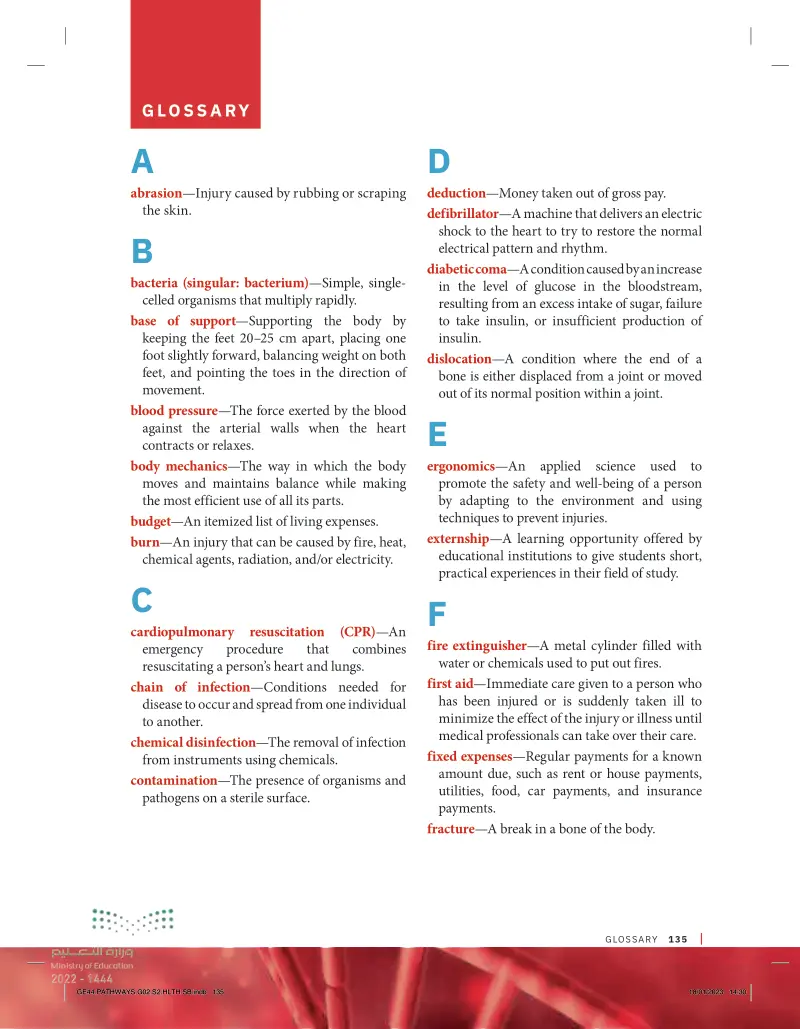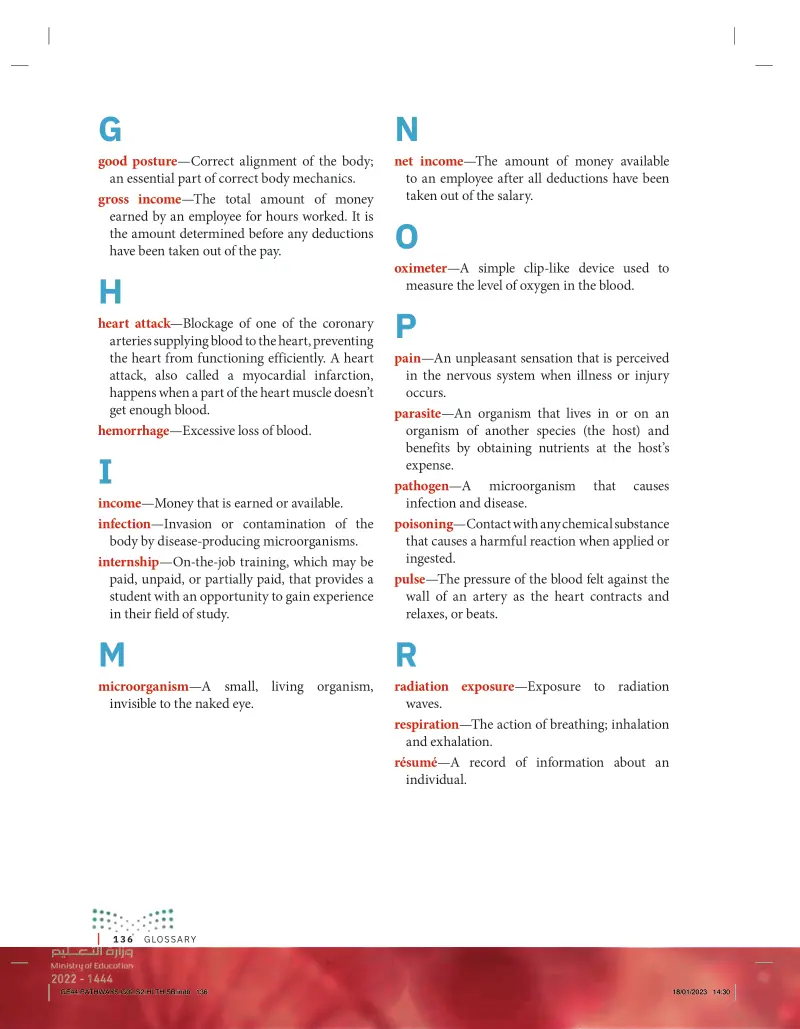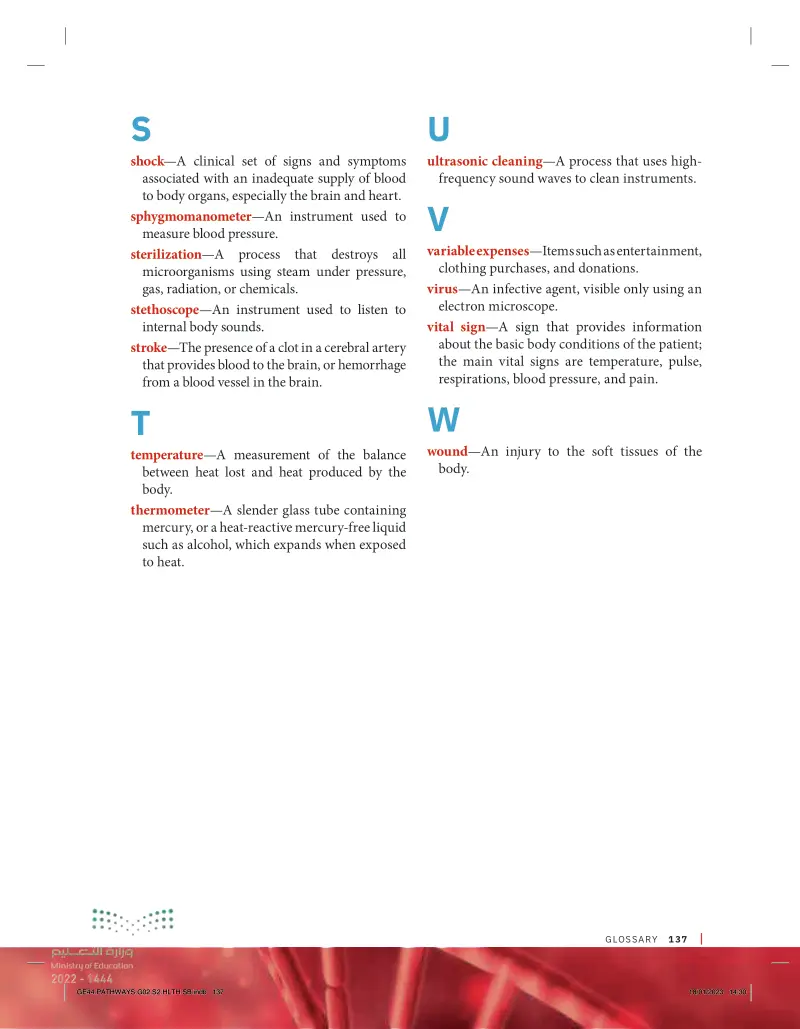Glossary - Principles of Health Sciences 1 – 2 - ثاني ثانوي
CHAPTER 1: PROMOTION OF SAFETY
CHAPTER 2: INFECTION CONTROL
CHAPTER 3: VITAL SIGNS
CHAPTER 4: FIRST AID
CHAPTER 5: PREPARING FOR THE WORLD OF WORK
وزارة التعليم GLOSSARY A D abrasion-Injury caused by rubbing or scraping deduction-Money taken out of gross pay. the skin. B bacteria (singular: bacterium)-Simple, single- celled organisms that multiply rapidly. base of support-Supporting the body by keeping the feet 20-25 cm apart, placing one foot slightly forward, balancing weight on both feet, and pointing the toes in the direction of movement. blood pressure-The force exerted by the blood against the arterial walls when the heart contracts or relaxes. body mechanics-The way in which the body moves and maintains balance while making the most efficient use of all its parts. budget-An itemized list of living expenses. burn-An injury that can be caused by fire, heat, chemical agents, radiation, and/or electricity. C cardiopulmonary resuscitation (CPR)-An emergency procedure that combines resuscitating a person's heart and lungs. chain of infection-Conditions needed for disease to occur and spread from one individual to another. chemical disinfection-The removal of infection from instruments using chemicals. contamination-The presence of organisms and pathogens on a sterile surface. defibrillator-A machine that delivers an electric shock to the heart to try to restore the normal electrical pattern and rhythm. diabetic coma-A condition caused by an increase in the level of glucose in the bloodstream, resulting from an excess intake of sugar, failure to take insulin, or insufficient production of insulin. dislocation-A condition where the end of a bone is either displaced from a joint or moved out of its normal position within a joint. E ergonomics-An applied science used to promote the safety and well-being of a person by adapting to the environment and using techniques to prevent injuries. externship-A learning opportunity offered by educational institutions to give students short, practical experiences in their field of study. F fire extinguisher-A metal cylinder filled with water or chemicals used to put out fires. first aid-Immediate care given to a person who has been injured or is suddenly taken ill to minimize the effect of the injury or illness until medical professionals can take over their care. fixed expenses-Regular payments for a known amount due, such as rent or house payments, utilities, food, car payments, and insurance payments. fracture-A break in a bone of the body. Ministry of Education 2022-1444 GE44 PATHWAYS 002 $2 HLTH 58: 135 GLOSSARY 135 18012023 14:30

G good posture Correct alignment of the body; an essential part of correct body mechanics. gross income-The total amount of money earned by an employee for hours worked. It is the amount determined before any deductions have been taken out of the pay. H N net income-The amount of money available to an employee after all deductions have been taken out of the salary. oximeter-A simple clip-like device used to measure the level of oxygen in the blood. heart attack-Blockage of one of the coronary P arteries supplying blood to the heart, preventing the heart from functioning efficiently. A heart attack, also called a myocardial infarction, happens when a part of the heart muscle doesn't get enough blood. hemorrhage-Excessive loss of blood. I income-Money that is earned or available. infection-Invasion or contamination of the body by disease-producing microorganisms. internship-On-the-job training, which may be paid, unpaid, or partially paid, that provides a student with an opportunity to gain experience in their field of study. pain-An unpleasant sensation that is perceived in the nervous system when illness or injury occurs. parasite-An organism that lives in or on an organism of another species (the host) and benefits by obtaining nutrients at the host's expense. pathogen-A microorganism that causes infection and disease. poisoning-Contact with any chemical substance that causes a harmful reaction when applied or ingested. pulse-The pressure of the blood felt against the wall of an artery as the heart contracts and relaxes, or beats. M R microorganism-A small, living organism, radiation exposure-Exposure to radiation invisible to the naked eye. waves. respiration-The action of breathing; inhalation and exhalation. résumé A record of information about an individual. 136 GLOSSARY وزارة التعليم Ministry of Education 2022-1444 RE44 PATHWARE NO S2 HITH 58 mths 138 18/01/2023 14:30

وزارة التعليم S shock-A clinical set of signs and symptoms associated with an inadequate supply of blood to body organs, especially the brain and heart. sphygmomanometer-An instrument used to measure blood pressure. sterilization-A process that destroys all microorganisms using steam under pressure, gas, radiation, or chemicals. stethoscope-An instrument used to listen to internal body sounds. stroke-The presence of a clot in a cerebral artery that provides blood to the brain, or hemorrhage from a blood vessel in the brain. T temperature-A measurement of the balance between heat lost and heat produced by the body. thermometer-A slender glass tube containing mercury, or a heat-reactive mercury-free liquid such as alcohol, which expands when exposed to heat. U ultrasonic cleaning-A process that uses high- frequency sound waves to clean instruments. V variable expenses-Items such as entertainment, clothing purchases, and donations. virus-An infective agent, visible only using an electron microscope. vital sign-A sign that provides information about the basic body conditions of the patient; the main vital signs are temperature, pulse, respirations, blood pressure, and pain. W wound-An injury to the soft tissues of the body. Ministry of Education 2022-1444 GE44 PATHWAYS 002 $2 HLTH Saret: 132 GLOSSARY 137 180012023 14:30






